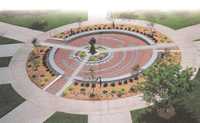
Gwen Bell
is honored with a Medium Paver from Nancy Kassebaum Baker
GWENDOLYN KAUCHER BELL
A life filled with love of family, affection for friends, participation in politics and commitment to community began August 13, 1923 when Gwendolyn Charlotte Kaucher was born. Carl and Blanche (Dickinson) Kaucher celebrated the birth of Gwen, their first child, at their home in Greensburg, Kansas. Carl had immigrated to Greensburg from Germany as a teenager shortly before World War I, and rose from farmhand to farm implement salesman.
Carl’s skill as a salesman brought him and his family to Wichita, where Gwen attended Washington Elementary School and graduated from Wichita East High School in 1941. Soon after, World War II began and Wichita changed almost overnight. Its population doubled in one year, and suddenly women were in demand to help fill the new jobs. It was during this period that Gwen landed an office job at Beech Aircraft.
After the war, Gwen took a position with Jack Douglas, CPA. It was there that she met Carl Bell, Jr., a charismatic and ambitious young lawyer who was destined for a career in politics and community activism. They were married in November 1946 and soon children followed: Carl III, Tom, Christine and Robert. The loss of their young daughter Christine to cancer in 1959 was a time of great sadness and grief for the whole family.
Gwen’s oldest son Allen describes her as “the quintessential mother and politician's wife — attractive, smart and articulate.” She was supportive of her husband’s career as an attorney with Fleeson, Gooing, Coulson & Kitch, LLC, and his civic activism that included serving as mayor of the City of Wichita and president of the Wichita Board of Education.
But, Gwen forged an identity and career of her own that also focused on community involvement and politics. In 1956, she began a long and active association with the Wichita League of Women Voters (LWV) that lasted into the early 1980s. A non-partisan group, the LWV has a long history of encouraging women’s participation in political issues and voter education.
Gwen took on her first leadership role in 1957 as Finance Drive Chair. The same year, she was nominated to the state board and, later, in 1969-70, served as State Legislative Chair. Gwen also began hosting an annual new member gathering at her home in the 1960s, a tradition that continued through the 1970s.
A two-year term as President (1966-68) was the highlight of Gwen’s years with the League of Women Voters. Her interest in politics and her organizational acumen had found a natural outlet during the 1960s and 1970s, a period filled with social change, both nationally and locally. The League was at the forefront of finding local solutions to controversial issues, such as opening housing, equal education, integration and city-county government consolidation, and Gwen was part of it all.
Gwen’s community involvement didn’t stop with the League of Women Voters. She was active with the Institute of Logopedics (now known as HeartSpring) and served as president of the Institute’s Women’s Advisory Council in 1964-65. The YWCA of Wichita benefitted from Gwen’s leadership when she served as Board President from 1974-76, and she served as chair of the Legal Aid Society board from 1974-75.
Her love of politics and her passion for involvement merged again when she committed to the position of manager of the Nancy Landon Kassebaum for Senate campaign in 1978. Nancy credits Gwen as the first person to suggest that she seriously consider running for the U.S. Senate. Gwen worked everyday on the campaign which successful propelled Nancy into the position of Senator from Kansas from 1979-97, the first woman in the country elected to the Senate who was not a widow taking her husband’s seat.
The election brought a new role for Gwen: Administrative Assistant for the 3rd District of Kansas for Senator Kassebaum. She worked tirelessly at that position until 1984, though she continued to manage Nancy’s campaigns for Senator in 1984 and 1990.
During this period, Gwen commuted to work in Wichita from the Bell family farm in southern Kingman County. Carl and Gwen had moved into the old farmhouse in 1982, after modernizing it. “Mom became a country gal, although she drove to town everyday to manage Nancy’s office, play bridge and attend meetings,” explains son Allen. The farm was a labor of love and the house was big enough to accommodate long visits from family and friends, including Gwen’s mother. Her father died in the early 1970s, so her mother often stayed at the farm.
In 1997, Gwen and Carl gave up their beloved farm and returned to Wichita. Today, she cares for her husband, attends College Hill Methodist Church, plays bridges and visits with family and friends. She is blessed with grandchildren: Christopher, Scott, Jeff, Richard, Alexandra Christine and a new grandson on the way.
Gwen Kaucher Bell’s life defines what it means to be a heroine: an exemplary woman devoted to her family and her community.
2005










